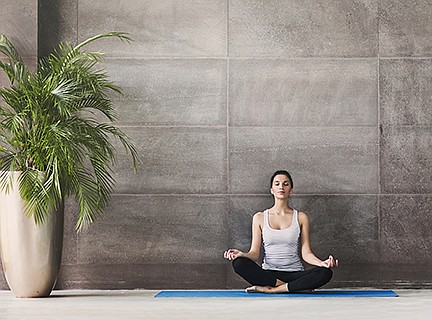Take a few deep breaths. Feel your arms, torso and legs relax as you let thoughts drift in and out of your head like ocean waves. Focus on your breathing, and feel the weight of your body.
That quiet mindfulness is really all there is to basic meditation.
For Jenna Wright, owner of Southern Soul Yoga on Manufacturers Road, meditation was ingrained into her from a young age. Her family used it to help her brother with his ADHD diagnosis, and since then, the practice just stuck, she says.
"Meditation helps to loosen up the brain, loosen up all of the muscles, [and] helps you relax," she says.
It's a technique that's been used for thousands of years to help alleviate stress, calm the mind and develop awareness of the present moment. According to the Centers for Disease Control, people using meditation increased more than threefold from 2012 to 2017, from 4.1% of the U.S. population to 14.2%.
From Silicon Valley executives to professional athletes to new parents - anybody can practice meditation.
It doesn't belong to any particular religious practice, according to Healthline. And there are different varieties to try, from the more common mindfulness meditation, which involves sitting comfortably and focusing on breath, to movement meditation, which can involve walking, gardening or focusing on the gentle martial arts of qi gong or tai chi.
For meditation practitioner Janka Livoncova, the practice is "about cultivating positive emotions to help better understand ourselves and how we think."
Livoncova taught meditation classes at the Center for Mindful Living in Chattanooga prior to its closure in 2020, and is an Insight Meditation teacher, registered yoga teacher and trained somatic movement educator, which focuses on the internal experience of movement.
Experts say meditation can be done in any position that feels comfortable to you, although most teachers suggest sitting so that you don't fall asleep. As Livoncova explains, with mindfulness meditation, all you do is "close your eyes, and you work on keeping your attention with the sensations of breathing."
For beginners, the best practice is to start small with 5-10 minutes of meditation, and then gradually build up. The key is to build a consistent practice, so that you can reap the benefits.
"[Mindfulness and meditation] can actually make a significant change in how we perceive our world, how we perceive things around us, and can have a significant health benefit," says Stephanie Wilkins, former executive director of the Center for Mindful Living. "There have been studies [done on] people who meditate more on a regular basis, where [scientists have seen] changes in a meditative brain compared to a person who is not meditating."
Specifically, the amygdala, a part of the brain that controls stress responses, is smaller during meditation, while the pre-frontal cortex, which deals with decision making, concentration and awareness, is thicker, according to Scientific American. These brain changes ultimately lead to better emotional regulation and greater sense of wellbeing overall.
Incorporating a regular meditation practice, as Livoncova explains, can help people regulate emotions and cultivate a greater sense of kindness, wisdom and compassion.
"You're a lot calmer, obviously, [once you start meditating]," says Wright, of Southern Soul Yoga. "[You have] better sleep, better eating habits for sure[and] better control of your breath. A lot of people don't breathe like they should, fully opening their diaphragms."
The more mindfully you approach your daily life, the better, healthier habits you can cultivate for yourself, she says.
Ultimately, Livoncova says, "meditation is helpful because instead of getting emotionalthe mind turns to more skillful qualities." And it's these qualities that enable us to live more productive, healthier, calmer lives.
Breathe in...
Let your mind clear. This can sometimes be hard to do, but the goal isn't to totally empty your mind. There's a common misconception with meditation that you have to clear your mind of any thoughts - but thoughts naturally come and go as you meditate. The goal to just to acknowledge your thoughts as they occur, without judgement, and then let them dissipate without acting on them.
Where to practice
Here are a few ideas to help you get started.
> Attend a yoga class. Many yoga studios, including Southern Soul Yoga, begin each session with a few minutes of meditation.
> Join one of Chattanooga Insight Meditation Community's weekly guided meditations via Zoom. The community practices a specific type of meditation - insight meditation, also known as Vipassana meditation.
> Download a free meditation app such as Headspace, Insight Timer or Smiling Mind.
